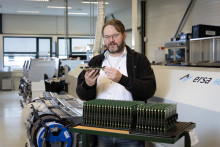Baby boomers, pragmatists, millennials: these descriptions of generations will probably be familiar. Every fifteen years sees the arrival of a new cohort, each with its own distinct characteristics. ‘These are often views that reflect the spirit of the age and the way in which a generation has been raised’, says Grondstra (pictured left). With Generation STORM, she is conducting research into the different generations at work. She also helps companies to get the different age groups to collaborate more effectively with each other.
 There are currently five generations active in the labour market. The bulk of the working population is made up of generation X, the pragmatic generation and generation Y. Although they have much in common, they also differ from each other. ‘Generation X, for example, believe it’s important to make use of diversity and focus a lot of attention on the quality of the work in order to avoid unnecessary risks. The pragmatists, on the other hand, really love speed and efficiency. They’re interested in how knowledge can be shared and how they can quickly switch to a new position at work. They’re results-oriented and attach great value to self-development.’
There are currently five generations active in the labour market. The bulk of the working population is made up of generation X, the pragmatic generation and generation Y. Although they have much in common, they also differ from each other. ‘Generation X, for example, believe it’s important to make use of diversity and focus a lot of attention on the quality of the work in order to avoid unnecessary risks. The pragmatists, on the other hand, really love speed and efficiency. They’re interested in how knowledge can be shared and how they can quickly switch to a new position at work. They’re results-oriented and attach great value to self-development.’
And then there’s generation Y. These are young adults who grew up in an era in which there was a rapid succession of advances in technology. ‘Because of their keen awareness of how hectic life can be, work/life balance really matters to them. They’ve also been raised with a sense of equality. If they work somewhere, they want their ideas to be taken seriously and to be asked for their opinions.’
Clashes
It is up to the employer to attempt to connect all of these groups to each other and bring out their strengths. And this is not always easy to achieve. Clearly, someone approaching retirement age will have very different ideals from someone just starting out on the labour market. But, according to Grondstra, that does not mean there is a generation gap. ‘That places the emphasis on the differences, whereas generations have many of the same views and wishes when it comes to work.’
New cohorts
But there can be clashes too. ‘Especially in organisations that have traditionally been hierarchical, the interaction is not always as good as it could be’, explains Grondstra. ‘Younger people can find it more difficult to fit in, because they’re expected to approach work in the same way as it’s always been done. But there are also many organisations that are very aware of the fact that new cohorts are continually entering the labour market. They look at what someone needs in order to fit in, the way of working is clearly explained and if a new employee prefers a different approach, they’re free to make that clear. There’s an appreciation of the differences and collaboration becomes automatic as a result.’
Generation Z
As an employer, it is therefore important to know what preferences a generation has and respond accordingly. Equally, if you have just graduated, you can prepare yourself as you take your first steps into the labour market. It’s now the turn of generation Z. Grondstra: ‘They’ve grown up in an era where everything is bespoke. An age in which they’ve been given immediate answers to all of their questions. When they start at a company, they want that sense of immediacy. They want to have a buddy or manager on hand to guide them. And not just for one day, but for longer, actually continuously. They want to have help to make optimum use of all their talents.’
Add something
‘At the same time, these new graduates need to be aware that they can add something new to an organisation. That’s why it is important to connect with others of the same generation, identify any outdated behaviour that leaps out at them and raise it for debate. Make it clear what it is that energises them. It’s highly likely that an employer won’t yet be aware of this since they’re the first in a new cohort.’
Updates
Listen to each other and be open to each other’s ideas. That is the basis for success when it comes to intergenerational working. And if the collaboration proves effective, the different generations can reinforce each other. Grondstra: ‘You could compare it to the updates on a computer system. In the early days, there was MS-DOS, that’s the basics. That was followed by regular updates: Windows 95, 98 up to where we are now. You can see every new generation as an update. It won’t work without the basics that all those previous updates provided – which is why you need to appreciate the older generations for what they contribute – but you also need to continually check to see what update is required and how we can support it in order for everyone to advance. Any organisation that embraces the renewal that a new generation brings improves its overall vitality as a result.’
Text: Willem Korenromp
Illustration: Valerie Geelen
---
4TU Career Special









